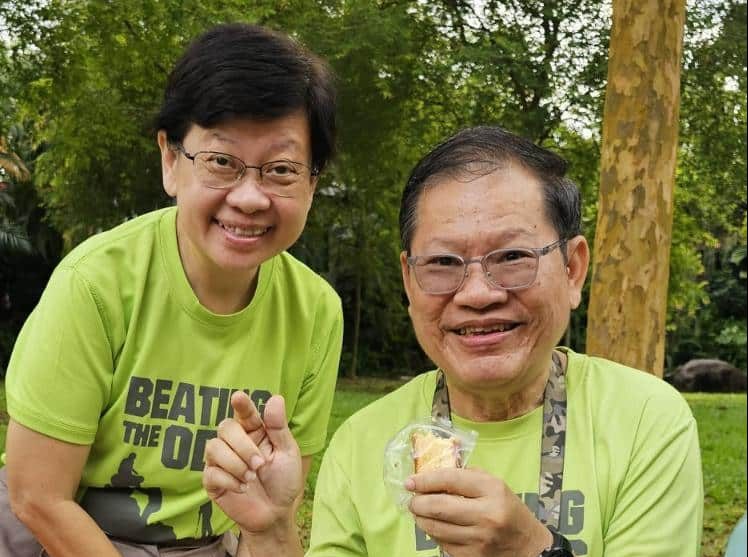There’s power in loving, living and growing your family within a community of faith: Jonathan Cho
by Christine Leow // September 1, 2023, 1:19 am

Jonathan Cho and his wife, Dorea, believe in raising their two children within the community of faith. At the D6 Family Conference, he shared how the experience has blessed and enriched him and his family. Photo courtesy of Jonathan Cho.
Jonathan Cho was home one evening with his children. He had a rowdy playtime with them before putting them to bed.
When he went downstairs to relax in his “T-shirt with holes”, his hair unkempt, he was greeted by a roomful of 14-year-old girls. His sister-in-law, who lives with him, had invited her youth class from church over.
As a youth leader in church, Jonathan was familiar with the girls. But he had only interacted with them “on stage in church when I talk, share and pray”.
“To be able to see you in the act of parenting, to be able to bear witness to that, is so precious.”
“I asked my wife, ‘Do you think it’s weird that they see a leader at home like this, you know, talking with my kids like that and unkempt?’
“She said, ‘No. In fact, it’s good for them because all they see on stage is the prim and proper Jon. But they don’t see you at home being real.
“’You share all your fathering and parenting stories but they don’t see you in the act of parenting. To be able to bear witness to that is so precious.’”
Jonathan, who has a passion for family and discipleship, shared this to underscore the importance of raising a family within a Christian community.
He was speaking at this year’s D6 Family Conference at which he spoke about Spiritual Friendship and the Family of God.
D6 Family Conference is an annual family ministry conference that focusses on generational discipleship in churches and home. Named after Deuteronomy 6 in which Israel was encouraged to keep God’s Word and to teach it the next generation, the goal of the movement is to equip families and churches to pass on a spiritual legacy to future generations.
Here are the highlights of Jonathan’s session on how to develop spiritual friendships that are essential for raising a godly family.
Surround yourself with godly examples
Our households are meant to interact with God’s household because not only do we have a biological family, we have a spiritual one as well. This was a point Jonathan emphasised. It is not just about being together, it is about needing one another.
“It’s critical to our own discipleship, growth and maturity,” he noted.
As a teenager, Jonathan was friends with older youths in his church who shared their experiences with him so that when it was his turn to go to a tertiary institute or enlist in the army, he knew what to expect. When he entered university, they even studied with him.
“I look at their lives and say, ‘How did you deal with this? Teach me, show me, I sit at your feet.’”
“Because of them, I grew a desire in my heart to serve in church as well because of these examples in front of me. I had models of what it looked like to love God together and live lives in a way that honoured Him.
“They sowed into my life. Were it not for these friendships, I probably wouldn’t have stayed in the church or even remained a Christian.”
But by the time Jonathan was in his 20s and starting a family, there were fewer older adults in church.
“I found myself thinking: I have to figure this out on my own. I don’t really know how this parenting thing is going. The best example I have is my parents.”
Then he got to know Elvin and Esther Foong who founded The Treasure Box SG (TTB). Watching how they raised their children and served God, Jonathan learnt much about Christian parenting.
Since then, Jonathan and his wife have surrounded themselves with friends of different ages – from their 40s right up to their 70s – and different seasons of their lives.
“I look at their lives and say, ‘How did you deal with this? Teach me, show me, I sit at your feet.’”
This is discipleship through the seasons of life, he noted.
Let people in
Jonathan also shared the concept of villages and ecosystems. His “village” consists of his family, both immediate and extended, his church which includes his cell group, the church leadership and the ministries within which he serves, his colleagues at work, and friends.
His family of four and his wife’s family of four all live under one roof. In addition, his home hosts various church meetings.
“Letting people in not only benefits us, it benefits them.”
“My kids grew up in an environment where they interact with the uncles and aunties in church because these people come by on weekdays. They sit around, they listen to stories.”
Young people can also benefit from being in such a community.
“I think it’s important for them to see that this is what a God-loving, God-honouring household can look like or should look like.
“That gives them a model of what they can build towards, what they can aspire towards. Letting people in not only benefits us, it benefits them.”
Because of this understanding, Jonathan keeps an open house even though he is an introvert.
“Maybe we can take a step back and say, ‘Even if I’m not comfortable, I can invite the uncle or auntie from church over, our spiritual family over and let them into the deepest, the most private spaces.’ It is very unnerving but also a very beautiful thing.”
Practise being a neighbour
The act of helping each other out also includes asking for help.
“Giving is very easy. But it’s harder to receive because it takes a lot of humility to say, ‘I need help.’
“As a young parent, sometimes when I ask for help, it feels like I’m saying I cannot make it, I don’t know what I’m doing. It feels almost shameful.”
Even when he has to ask his parents to mind his children, Jonathan confessed it feels like he is “not good enough”, something he realises he needs to overcome.
“Our proclamation of the Gospel has social consequences in all areas of life.”
He shared a valuable insight he learnt about asking for help.
When he was still dating his wife Dorea, he offered to babysit his cell group leader’s four-year-old. Along with another couple, they took the boy to the aquarium one Saturday. They had an afternoon of fun but it was also an afternoon learning.
“I didn’t realise how hard it is to care for a little boy.”
When Jonathan had his own children, he realised how hard it must have been for his cell group leader to release his child to the care of someone else.
“It’s the kind of trust, the kind of humility, the kind of maturity that says, ‘I trust you with this. I even think it’ll be good for you. So I release my child so that it can bless you in some way.’
“That’s what I learnt from my leaders. It’s counter-intuitive thinking: My decisions can help you flourish in some way.”
In this way, the proclamation of the Gospel and the demonstration of it go hand in hand.
“Our proclamation has social consequences in all areas of life.
“It has evangelistic consequences. We are bearing witness. We are showing people what we truly believe about who God is by the way we choose to live, by the way we give to others, by the way we invite others into our lives.”
Think inter-generationally
How we steward our lives and interact with people have the possibility of impacting generations down the line. Jonathan underscored this point with a story.
When he got married, his guest list numbered 900. His own friends made up only 20% of the guests.
“Sowing into the lives of our children and grandchildren has to be intentional and intergenerational.”
“When I looked at the 900 people, I found myself saying, ‘Thank you everybody for coming. Most of you are my parents’ friends. I don’t know all of you. But I guess you are here because you are important to them.
“‘And you sowed into their lives in some way to make them who they are. Because they are who they are, I am who I am. And that’s how we are now one unit. So you play a role.’”
Drawing from Deuteronomy 6, Jonathan shared how God also sees passing on the faith from generation to generation as vital. This is known as spiritual capital. There are four other capitals that we can leave for the generations to come.
Financial capital is the money that is left for the next generation. Human capital refers to the people in the family and their well-being. Intellectual capital are the stories families pass down and the knowledge they gain over time. Social capital involves the relationships within the family and the community.
“Sowing into the lives of our children and grandchildren is about all these arenas. It has to be intentional and inter-generational.”
RELATED STORIES:
We are an independent, non-profit organisation that relies on the generosity of our readers, such as yourself, to continue serving the kingdom. Every dollar donated goes directly back into our editorial coverage.
Would you consider partnering with us in our kingdom work by supporting us financially, either as a one-off donation, or a recurring pledge?
Support Salt&Light



